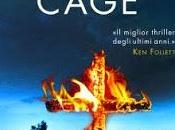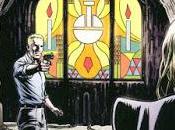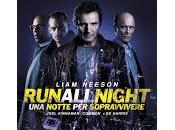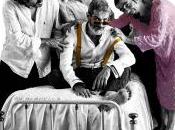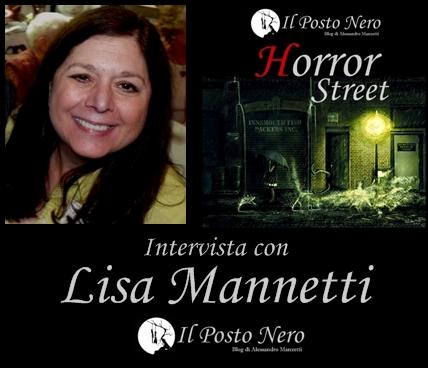
Interview with Lisa Mannetti
[Alessandro Manzetti] You debut in horror with The Gentling Box, winner of the Bram Stoker Award 2008 for best first novel. You set the story in the nineteenth century in Hungary and Romania, transporting the reader into the gypsy culture. The supernatural is strongly present in the novel, the spirit of the witch Anyeta, one of your characters, moves back and forth between the pages. Black magic, ghosts, rich historical documentation on distant and different traditions, pathos. How come you choose to tell the gypsy culture? Is there a direct experience? I heard that you know how to interpret the tarots
[Lisa Mannetti] When I was a very young child I had already developed a fear of abandonment and also a fear of being taken away from my family. It started when I was in the hospital for an ear infection and my brother was crying because he was afraid I’d miss Christmas. Subsequently I watched a special about the Holocaust on TV and dreamt I was visiting my Zia and I heard the sound of Nazi jackboots on the stairs and tried to hide terrified I’d be found and taken away. At the same time, my mother told me there were gypsies living in a house in our town and I should never walk down one particular street by myself. Although, I have a feeling she was using gyspies as a euphemism for either prostitutes or thieves; at any rate I did know from reading that gypsies stereotypically were thought to steal children. Even though she dressed me as a gypsy for Halloween (notably once as St. Sara the gypsy for my local Catholic grammar school) several years in a row since I didn’t outgrow the costume, I was still afraid of being snatched or abandoned. At the same time, the gypsy culture fascinates me, so I chose to write it about in The Gentling Box. Yes, I read the Tarot. Interestingly, my best friend at the time gave me a Rider-Waite deck as a birthday present when I was 16. The images terrified me. The accuracy of the cards frightened me even more. So, I threw it all away. Years later when I was researching The Gentling Box, I thought I might include a Tarot scene, so I taught myself the cards again (and took a few classes as well). I never used the Tarot in the book, but have been left with a very interesting hobby, or ability if you prefer.
[AM] You have written many short stories published in various magazines and anthologies. What is the story that you're more attached to? Would you tell us the plot of an unpublished short story?
[LM] I have a couple of favorite stories. One is Everybody Wins (in These Guns for Hire) which has been made into a short movie called Bye-Bye Sally (directed by Paul Leyden and starring the brilliant Malin Ackerman). I like its raucous dark humor. A second favorite is Spy Glass Hill which just came out in Fear of the Dark Anthology and mainly I’m drawn to it because in some ways it still pulls me in and I plan to turn it into a short novel in the future. The images still haunt me and they were based on a very disturbing but wonderful dream I had. Yes, I’m working on a story right now set in an abandoned school in Millbrook New York about a girl who has been grievously wounded, her right breast has essentially been amputated through an accident. She becomes the subject of some nasty untrue gossip and finds it impossible to cope with the betrayals she experiences. The story opens with her on the verge of committing suicide. I hope the reader will feel her pathos and pain.

[AM] Your last name betrays its Italian ancestry, is it true? Have you ever thought of setting one of your stories in Italy?
[LM] Yes, I’m certainly Italian. My father was born in Guardia Lombardi. All four of my grandparents were born in Italy as well. I have cousins in Naples and Campobasso as well as Florence and Rome. With the idea of writing, I lived in Venice on my own in an apartment I rented in the Castello sestiere for four months—decidedly not during the tourist season (except for Carnevale). And I not only loved the city itself, I loved the people in my neighborhood who lived and worked there. It was the single most fantastic experience of my life. I loved shopping every day for fish or vegetables or meat—I cooked a lot, wrote a lot and had family and friends come to visit. Like all of Italy, there is beauty in the works of the master sculptors, painters and in the stones and the streets themselves. I hope to live there again some day. Yes, I wrote a book called The Lamia (not published yet) which is set in Florence and Rome. I also wrote a short story called, Castello 985 which is set in Venice during Carnevale.
read Castello 985 on Lisa Mannetti blog
[AM] Recently (2010) you have published Deathwatch, which collects two novellas, Dissolution, current edition of Bram Stoker Award nominated (Long Fiction) and Sheila Na Gig. Both stories are disturbing and grotesque, they share the ownership of transferring images of eroticism together with a strong shudder of terror which rock back and psyche of the reader. What else connects the two novels of Deathwatch? What are the dominant themes?
[LM] I don’t want to give away too much because there is surprise for the reader at the end, but they are definitely companion pieces. Naturally, they both deal with the supernatural (they are horror after all) but for me, the most important thematic element they share is the intricate dissection of broken childhoods. These characters—and those around them--are in pain. In the first work, Dissolution, Stuart Granville is a would-be medical student from the South who's been sent down for drinking and believes he's heading north to Hyde Park, New York to tutor twin girls. Instead, he discovers that his charges, Abby and Eleanor, not only have never been to school of any kind, but that they are siamese twins their father, a doctor with grandiose dreams, means to separate surgically, taking advantage of Stuart's expertise and his vulnerability--as well as the supernatural forces at work in the house itself. In The Sheila Na Gig, Tom Smith is on a ship in steerage and bound for New York from his native Ireland after facing down the constraints imposed by his family, overcoming the loss of his first love, circumventing his grandmother's wiles and occult knowledge, and trying to save his younger, mentally challenged sister, Delia, from both witchcraft and sexual abuse. Both Tom and Stuart are likeable, intelligent, emotional and have practical skills; and both must contend with matriarchs (archetypal crones) who possess uncanny powers and who are bent on destruction—or, perhaps, annihilation is a better word—to achieve their own ends.
[AM] What is the place you are more scared of in the city where you live? How do your emotions change from day to night?
[LM] This is a great question and something I’ve never thought about consciously, so thanks for giving me the chance to mull it over. I’ve certainly been afraid in the town I now live in as well as in New York City when I lived there...though mainly those fears have revolved around fear of intruders. Once when I was living in Manhattan, someone followed me (while I was carrying a huge bag of groceries in my arms) very nearly to my apartment door and I was really nervous. Another time about 15 years ago, in a town near to where I lived upstate (Poughkeepsie, NY) I was in post graduate school in New Paltz and I was meeting two classmates for a group project. The area is very safe and yet, for the entire week before we were supposed to meet I kept hearing this voice shouting in my head, Lock your car doors! The really odd part was that I generally did lock the doors when I parked, but for some reason I kept forgetting all week every time I went to school. One of the students never showed up at the meeting place that friday night, so the other girl, Cynthia, and I decided to go to a restaurant on our side of the Hudson River to have dinner and discuss the project. As I was leaving the first meeting place I heard it again, a scream in my head. Lock the doors! I was surprised to discover, though I thought I had locked all four car doors, they were not locked. We went to dinner in a very safe neighborhood at a very nice restaurant near Vassar College. We each had one glass of wine with dinner—and no more. Anyhow, when we left, it took me a while to adjust my mirrors, my seat belt, pull out of my parking space, etc. Cynthia was parked at the end of the street and she left. The road was deserted. Suddenly this guy walking on the sidewalk behind some trees pretended to fall in front of my car. I stopped. In the second that I hesitated he straightened up and he was not kidding around, nor was he a drunken college student. He was about 35. He suddenly appeared not only sober, but very agile. In a second, he leaped and tried to pull open the passenger door. Then he tried the passenger door in the rear of the car. Then, faster than I’d have thought since I was stunned, my heart pounding from what I thought was nearly running him down, he tried the rear passenger door on the driver’s side, and then finally he tried pulling on the handle of my door. I took off then!
I often get psychic messages that I hear. I write the same way: I hear what’s happening (then I see it). At any rate, I think angels or guides were actually protecting me and warning me because no one would have missed me before Tuesday when class was scheduled. That was scary as hell. Even though I’m still somewhat nervous here (in the house I grew up in) especially of going down to the cellar or up into the attic at night, I feel that my mother who passed away protects me quite often. That’s a relief. She was really a loving, terrific and brilliant person and I often sense her presence here. Oddly, though on some level the night makes me uncomfortable, I’ve been a night owl since I was a kid. Partly as a response to a fear of the dark (which lasted until I was a young adult) I began staying up late as a child and reading. I think my emotions are closer to the surface at night. I can distinctly recall that as a child when I saw the outline of the branches of the elm tree next door against my window, I imagined it was a woman tied to a chair burning. It scared the hell out of me. I also had night terrors. My parents were going to take me to a psychiatrist (mainly I think because I was keeping everyone else up at night and they both worked) but then I wrote a story when I was eight about a girl who thinks vampires are coming for her...but the end of the story is that she realizes it’s her mother bending over her to kiss her good night while she sleeps and that “goodnight kiss,” is not the harbinger of one of Dracula’s minions, but a trigger for bad dreams. My mother read it and realized she came in to kiss me each night....she stopped doing it and stopped triggering a replay of Dracula and bad dreams. When I was a little older, she had a real sense of humor about it....a couple of times when I went to my room to sleep I found she had put garlic on my pillow--and we had a good laugh about it. She loved that I was imaginative but she wanted to remind me that fears were just fears....better to write about them and conquer them than to give in!

[AM] Let's go back to the stories, on Shroud Magazine issue 10 (2010) you have published 1925: A Fall River Halloween, this work is nominated in the current edition of Bram Stoker Award (Short Fiction). From the title, we learn that you will bring us back in time again, through your gothic imagination. Tell us how was born this story and if short stories are the narrative form that you prefer
[LM] I’ve been a huge Lizzie Borden maven since I was in college and when Kevin Lucia asked me to write a story for the Halloween issue of Shroud Magazine last summer, I started thinking about Lizzie again. (I usually visit the murder house every summer after the Northeastern Writers Conference with my friends and, yes, it is haunted.) I’ve written about Lizzie before, both fiction and non-fiction, but this time I wanted to focus on a different time in Lizzie’s life—when she was an old woman and living in the house she bought on French Street in Fall River, Massachusetts. The story centers on a young girl named Delia Borden. Like Lizzie she grew up in the less desirable part of the town and moved to the preferred section, which was known as The Hill. Like Lizzie Borden she is an outcast. (Lizzie Borden was acquitted of the hatchet murders of her stepmother and her father, but she was essentially shunned by local society.) She and Lizzie become friends But Delia feels betrayed....so things happen....(Grin. I don’t want to spoil the story.) I love writing short stories, but I love writing novellas and novels, too...in one sense I don’t have a preference because each “tale” demands its own length to be told. There are times when a book idea becomes a story or a story may demand more depth and turns into a novel. Each work has its own mandate and that’s what I follow.
[AM] I know you're writing a new novel, The Everest Haunting, the story of a woman attempting a climb which will be full of surprises, an experience of the paranormal and the supernatural. Why did you choose this scenario? Would you give us a few lines, and let us experience the atmosphere of your new work?
[LM] I got hooked on the whole idea of mountain climbing when I first read Jonathan Krakauer’s Into Thin Air. After that experience I read everything I could get my hands on...I mean everything. These are stories—by some excellent writers—that span the gamut of terror and courage. I have at least 60 books on my “research shelves” as well as DVDs. I started thinking about my own fear of the cold, my fear of heights and how terrifying the experience of mountain climbing could be: from falls, to cave-ins, to hypothermia. My mother was an operating room nurse when I was very young, then she went back to school and became a public health nurse and ultimately a public health director; therefore, because she talked about her experiences anything medical fascinates me. I also sensed the pain and exhilaration that someone like Maurice Herzog experienced in climbing Annapurna...imagine trying to find the mountain before even climbing it, then becoming so obsessed that you succumb to horrendous frostbite...and his is only one story. There were some climbers on Denali in Alaska who holed up in a snow cave for days and, with the wind chill factor, the temperature was -148 degrees. Oh my god...you read this stuff and it boggles the mind. It speaks to human spirit, to courting incredible danger, to persevering through sheer will. I also researched Sherpa culture and, ironically, my brother is ‘trekking’ to Everest base camp right now. I wish I were there. I was supposed to go a few years ago, but was advised against it because of the political situation at the time...
read an extract of The Everest Haunting

[AM] And now, two Horror Street classic questions:
In this heading we try to learn about new landscape of horror literature, through direct experience of the authors. What are the new trend of horror? Could you name some new authors who are conducting original projects?
[LM] Zombies seem very popular right now and one of my favorite authors, Joe McKinney, has a new book out called Flesh Eaters. Another writer I respect, John Skipp, has a film he’s written and directed, Rose, the Zombie Puppet Musical. Robert Dunbar, one of best writers around, and, in my opinion, a national treasure, has a new book called Willy which has been getting a lot of fabulous reviews and deserved attention. Corrine De Winter, who won the Bram Stoker for poetry has an incredible graphic novel, Dark Stars, coming out with Shadowfall Publications—Glenn Chadbourne, who has illustrated for Stephen King, did the art work and the project is amazing. I’d also highly recommend anything that appears by Peter Straub or Joe Hill. Jeremy Shipp is another true original. Other authors to keep an eye on include Lisa Morton, Gary Braunbeck, Tom Piccirilli, Lucy Snyder, Monica O’Rourke and Robin Spriggs.
[AM] We leave the reader to imagine of walking along a dark and lonely road going back home, and having to turn the corner. What (or who) does he find around the corner?
[LM] The gray buildings, not quite realistic, not quite fantastic, but slightly surreal and dreamy-- like those in old Germanic expressionistic films--have been leaning closer for several darkened blocks. Ahead on your right, you see the dense black cave of an archway. Closer now. Nothing to worry about: some punk has grafittied ancient stone into an open mouth with yellowed teeth. Cross to the left for luck or superstition or safety, past the closed shops. Whatever they are selling—tall shoes or cunning beads or sleek electronics or elongated jars filled with perfumes or sweets, somehow the dim lights and wavering forms remind you of looking at a worn kaleidoscope or a crumbling reef under an olive sea. Is it just the sound of your heels clocking on the pavement and echoing off old stone that makes you think someone is following? Put a hand in your pocket to feel the familiar contours of the cell phone. Miranda is just a call away. Not ten minutes ago you kissed goodbye outside the bar. Ciao, Cara. Domani. You stop, thinking you could call if you needed to, but how silly, really. And for a second there is relief because the street is quiet while you finger the phone. Before you step forward, the lonely hollow noise of stealthy boots tip-taps stealthily...then stops. Ahead, an iron lamppost listing ten degrees and topped with a curlicue finial squeezes out a cone of yellow light. That’s your haven. Count paces. One, two, three. Ten or less you’ll be there, at the corner and turning and, then, for god’s sake, it’s not 100 steps to your front door and of course there’s nothing, but better to be cautious so your right hand descends into the other pocket and the keys, the familiar keys, are inside your fingers so you can enter home’s safety without a single second of delay. Step step. Clock clock. In the gauzy well of lamplight now, aware of ordinary sounds: someone banging a window closed, the smack of a bundle of morning newspapers hitting a curb, a belled cat trotting nearby. An exhale of relief. Turn the corner... An old blind woman, head nodding, face and arms covered in scabs, holds out her hands from under gray rags, begging for alms. Nothing to fear. Toss her a coin for luck. Good karma. Now, indifferent to her muttering and rocking, the imagined stalker forgotten, you look up to see the foyer lights you left on hours ago gleaming with welcome. But in that instant, your mind focused on the warm room, the comfortable bed, in that instant....an age-mottled hand with sharp nails snags your trouser leg...and in that instant you know that you are going to the darkest seams of your worst nightmares.
Thanks to Lisa for being the guest of Il Posto Nero blog (The Black Place blog)

Authors Profile
Lisa Mannetti's debut novel, The Gentling Box, garnered a Bram Stoker Award. She has authored a macabre gag book, 51 Fiendish Ways to Leave your Lover, as well as non-fiction books, and numerous articles and short stories in newspapers, magazines, and anthologies. Recent and upcoming works (2010) include Resurgam in Dead Set: A Zombie Anthology; Condemned in Legends of theMountain State 4; 1925: A Fall River Halloween in Shroud Magazine (Bram Stoker Award nominated) ; and Spy Glass Hill in Fear of the Dark Anthology. Her story, Everybody Wins was made into a short film by director Paul Leyden starring Malin Ackerman and released under the title Bye-Bye Sally. Her lastest work (2010) is Deathwatch, which collects two novellas, Dissolution, current edition of Bram Stoker Award nominated (Long Fiction) and Sheila Na Gig. Lisa Mannetti is now writing her new novel, called The Everest Haunting. Lisa Mannetti Web Site

Leggi l'intervista in italiano
(interview by Alessandro Manzetti)
